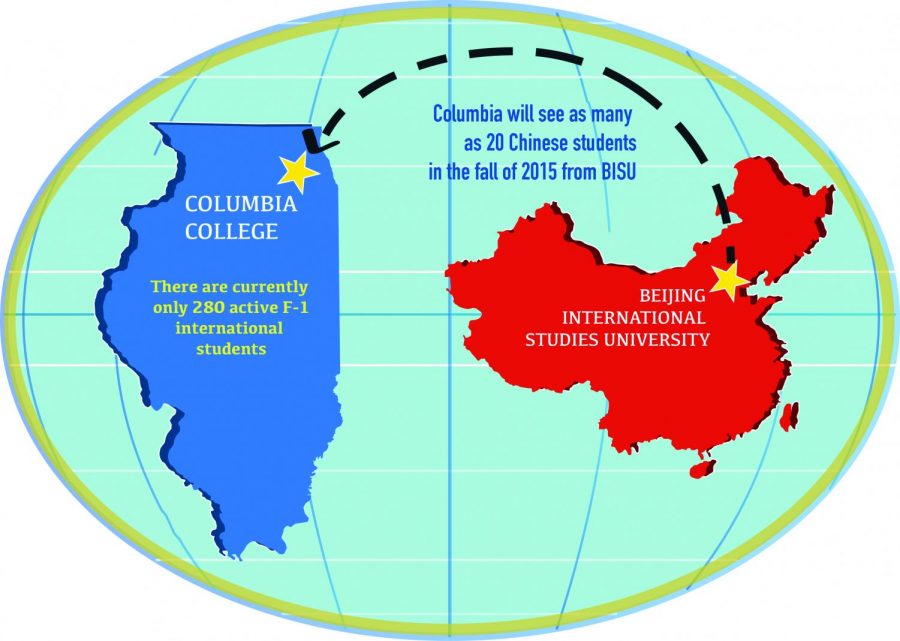College makes agreements with Chinese universities
College makes agreements with Chinese universities
April 20, 2015
The college may see an influx of international students as soon as the Fall 2015 Semester due to new agreements made between Columbia and higher education institutions in China, an initiative put forth by the provost’s office to boost the college’s international enrollment numbers.
The college has made four formal agreements with Beijing International Studies University and Beijing Film Academy that will bring Chinese students to the college, according to Senior Vice President and Provost Stan Wearden. The college is also pursuing deals with three additional institutions in Shanghai, Wearden said.
The agreement could net as many as 20 incoming students from BISU for the Fall 2015 Semester, with students from BFA likely to join the college in the Fall 2016 Semester, Wearden said.
“[Chinese institutions are] really interested in partnering with U.S. institutions so they can help educate students on culture, entertainment, arts, performing arts, those kinds of things like we do here,” Wearden said. “China [also] has a very large population of college-age students who come of age every year, and they’re really not able to effectively serve that population—they just don’t have enough institutions of higher education. For that reason, they are also interested in sending those students abroad.”
Wearden said all incoming Chinese students must qualify to receive an F-1 visa in order to be a student in the U.S., which includes being able to show a passport, prove they have more than $42,000 to cover academic expenses and demonstrate proficiency in English.
Susan Strow, assistant director of International Admissions, said international students are not eligible for federal financial aid and all but one Columbia scholarship. Additionally, these students will also be required to pay the college’s heightened international application and orientation fees.
International students will help combat the college’s declining enrollment rates, Wearden said.
Columbia has 10 exchange programs with colleges worldwide, said Gigi Posejpal, director of the Office of International Student Affairs. However, the agreements that Wearden has made will be for students who plan to graduate from the college, she said.
“It was a natural progression that from these exchange programs we also would be looking at students who would, in fact, want to be here as full-time, degree-seeking students that would graduate from Columbia with our degree,” Posejpal said.
She said she is excited about Wearden’s agreement on behalf of the college and hopes it will raise Columbia’s status worldwide.
Strow said making the college recognizable on an international scale is something the Office of Admissions has been actively pursuing through international trips.
“The more visibility [Columbia] has, the more attractive it becomes to students, especially with students coming from countries where status is important to them,” Strow said.
Posejpal added that multiple programs in the Office of International Student Affairs are aimed at making the transition easier for non-domestic students, such as a buddy program and different social gatherings hosted throughout the semester.
In addition to creating agreements for students to transfer to the college after one year at their Chinese university and graduate with a Columbia degree, Wearden said students who met the admission criteria would be allowed to complete a “three plus two” agreement in which they would apply for Columbia’s graduate program after three years of study at their home institutions and would then be able to finish both their undergraduate and graduate degrees at the same time while in the U.S.
“That [agreement is] very attractive to a lot of Chinese students and their parents,” Wearden said.
Wearden said the college plans to create programs to help Chinese students become accustomed to American culture and to help faculty develop “cultural literacy” through a series of workshops to help students take on the challenges of being an international student.
While Strow said this agreement with China is a good first step, she wants to see similar plans made with other institutions around the world.
“With China, you don’t want to put all your eggs in one basket and I see a lot of institutions doing that,” Strow said. “I definitely think there are qualified students throughout the world, not just in China.”
Wearden said the college is interested in making formal agreements with other countries in the future, particularly India and Brazil, where there are developing economies.
Posejpal said an influx of international students will not only be beneficial for the students coming to the college, but also for current domestic students.
“We live in a world where the globe is getting smaller and smaller,” Posejpal said. “To be an educated person in this day and age, the person has to have some kind of global perspective. You are not going to get that unless you have been introduced through your curriculum to global concepts, to different ways of viewing things [and] other perspectives.”








